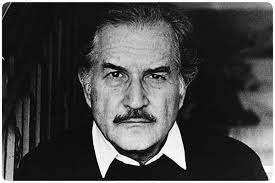Why do I teach? Part 1
File that under questions that are never asked. But back to that later. For now, my answer - for today.
It is the finest spring day the Midwest can produce, and believe me your life isn't complete until you have experienced one. The sky is flawless, the sun is warm, the air is crisp, everything smells of new life, the colors are the brightest ever seen on planet earth. Best of all is the satisfaction, relief really, that you have survived another Midwest winter. You made it, and this is your reward. There are things I could enjoy doing outside, involving the dog, plants, dirt, parks, a novel on the deck.
Instead, what I want to do - REALLY want to do, have been looking forward to all morning on this bright Sunday - is prepare for class tomorrow. I will re-read a story by Carlos Fuentes called "La pena" ("Shame"), remembering how awestruck I was when I read it the first time three or four years ago. I wondered then what class I could build around the work of Fuentes and the other master of 20th century Spanish language and literature, Gabriel García Márquez. I had been immersed in García Márquez on and off for decades, and never got beyond Wow as my considered response to his work. The class I teach now is called Cultural Storytelling, and it's offered in Spanish through the Spanish and Portuguese Department where I am jointly appointed.
It feels like a dream to stand before a room full of intent young people, all of us speaking Spanish. Spanish and literature have always been my life, never my living. When I read “La Pena” on this Sunday afternoon, imagining what they will make of it (the central figure is a young Mexican man who goes to study medicine at Cornell University in the US; alas, complications ensue), I know they will tune in to it differently than I did. They are less likely to gasp in awe at the beauty of the language, more likely to focus on the love story and what happens to the study abroad romance. I will ask "What did you make of this?" and they will be off and running; they're a good group. I'll make a few suggestions, they'll take notes like I'm saying something important, and that will feel pretty good. Then we'll turn our attention to an assignment they have related to this and other stories by Fuentes. As I read and take notes I notice I'm beaming, and my heart's pounding, and that I wish it were tomorrow already and time to go to class.
So one answer to why I teach is that I would rather be re-reading a story by Fuentes and preparing to discuss it with smart, energetic young people than anything else I could be doing today, despite the nice weather and the Sunday afternoon. The reader skeptical of magic could be forgiven for thinking it's the novelty of shifting to Spanish and a new set of texts and tasks after a lot of years teaching more or less the same thing. Once I finish with Fuentes, though, I will work on the lecture for the introduction to communication studies class that I will also teach tomorrow. I've taught that class probably 10 times by now, and this time - as always – I’m sure I finally have it right. I go through my notes from last time, and cringe at some of the examples that worked well then but now seem lame, dated, oversimplified. Have I got a great one THIS time! Oh, and here's a new and better way to have that diagram work. And if I move this point before that one, it will make so much more sense. Some people enjoy crossword puzzles; I hate them, because I'm completely incompetent at them. I can read every single clue and not get a single answer. Revising a lecture from two semesters ago is my equivalent of a New York Times Sunday crossword (if that makes me pathetic, so be it). It's that exciting, that much fun, and even better: I can do it.
That's why I teach. I love it, and - unlike crossword puzzles, comforting the sick, long division and any number of other things - I can do it.
In Part 2, back to why no one asks me – or you – why we teach.
Commenting is not available in this channel entry.


Comments